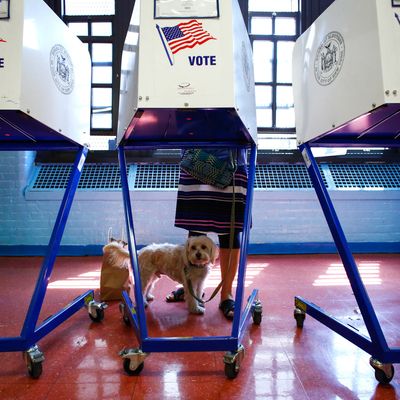
As we drift toward Election Day with Hillary Clinton holding a not-so-big but relatively stable lead in the polls over Donald Trump, the arguments Trump supporters have for hoping the “real” contest is dead even are becoming familiar.
There is Kellyanne Conway’s “shy Trump voter” theory, which has the advantage of being impossible to entirely disprove (if voters are lying to pollsters in significant numbers, why pay attention to polls at all?), but the disadvantage of being contradicted by Trump’s underperformance vis-à-vis polls in the primaries. There is the ostensibly plausible idea that all those people expressing a preference for Libertarian Gary Johnson — who is right-of-center like Trump — will “come home” to the GOP in November. The problem there is that everything we know about Johnson voters suggests he is drawing equally from the two major-party candidates, which means a general “let’s get real” decline in his support would not benefit either of them.
Finally, there is the fact that the ranks of undecided voters are larger than in recent presidential elections. Could they break disproportionately to Trump?
Until pretty recently there was a political-science nostrum known as the “incumbent rule,” which could have supported such a scenario. It held that in most elections voters make up their minds first about the better-known incumbents, which meant late deciders tended to break toward challengers. Technically, of course, Hillary Clinton is not an incumbent, but she is functionally an incumbent since her party has held the White House for the last eight years. A bigger problem is that Donald Trump is as well known as Clinton; voters are not just “discovering” him late in the cycle after having written off HRC. But in any event, the “incumbent rule” isn’t very widely subscribed to anymore, at least in presidential elections; it lost support decisively after 2004, when late deciders did not, as anticipated, move toward John Kerry.
More important, what we can discern from public-opinion surveys about this cycle’s undecided voters does not indicate any sort of “hidden” Trump majority.
A detailed new analysis of undecideds by David Brady of RealClearPolitics and Douglas Rivers of Stanford, based on YouGov’s very large sample, shows pretty clearly that people who are not currently prepared to support either Clinton or Trump are not “leaning” in the mogul’s direction at all. In fact, a slight lean to HRC is evident across various categories of dissatisfied, disengaged voters:
Respondents who said they are voting for a third party favored Clinton over Trump by a narrow margin of 31 percent to 29 percent and voters who are undecided narrowly go for Clinton, 31 percent to 30 percent, while non-voters, if forced, choose Clinton, 33 percent to 27 percent. The 40 percent who still do not choose to vote or don’t have a preference represent some 10 percent of the potential electorate. When asked whether they liked Clinton or Trump “even a little,” only 22 answered affirmatively for Clinton and 19 percent for Trump.
A separate analysis of undecideds by Politico’s Steven Shepard reached a similar, if somewhat more tentative, conclusion:
While most pollsters insist it’s too early to predict which candidate is likely to win undecided voters over, Clinton would appear to have the most to gain or lose: They’re more likely to come from a demographic — younger voters — that’s more inclined to back her, and in some surveys have a slightly less negative view of her than of Trump.
Even if you discount the evidence of a Clinton lean among undecideds, nobody is espying some big reservoir of votes for Trump. The most deeply alienated among them — those you might expect to cast an “I hate everything” vote for the mogul — are more likely just going to express their disdain for politicians generally by staying at home.
Indeed, once pollsters switch from “registered” to “likely” voters in the next few weeks, a lot of these “life sucks” voters will probably be weaned from the samples. In that case, the odds of a submerged Trump majority will probably decline even more. So he’d better do better with the voters actually willing to express a preference. Yes, something weird could happen that will change everything, but if so, we’ll see evidence for the change right out there in the open.






























